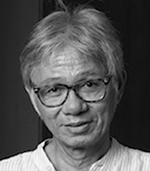

In the latter half of this generation, we as a people professing to be a nation have been making shameful history. Not that we have not made enough of it; the greater spectacle is not that we have been repeating ourselves, but that we have been surpassing ourselves.
In the current episode, the principal characters are a former president, a sitting one, and, ranged against their vicious alliance, a battler whom we, by our own obliviousness or default or collaborationism, have cast as a sort of Quixote who would be lucky to have one loyal, never mind all-but-useless, Sancho Panza along. Actually, the tragedy is as much our own as his: our Quixote is up against a real enemy, not an illusory one, and, further, an enemy that, not unlike a plague, chooses no victims.
These 3 characters are, in that order, Gloria Arroyo, Rodrigo Duterte, and Antonio Trillanes IV, and here's how the dynamics work between them.
Arroyo and Duterte are bound in a conspiracy so brazen a special thickness is required for anyone to honestly miss it: they are plotting to perpetuate themselves in power because it's the only way they can escape being brought to justice for their crimes. They want to appear running on separate tracks, but it's difficult to disguise their shared destination: dictatorship.
Duterte, a lazy-minded and not so psychologically stable Marcos idolater, has been looking to precook the right emergency, and he seems to have decided on the most recycled one: everyone who's after him is a communist son of – as he is wont to say of anyone he dislikes – a not so very nice mother. He's hoping it would make for a salable pretext for declaring martial law or a revolutionary government. If he has been unable to act on his plot yet, the only plausible reason I can think of is he has not sold it fully to the indispensable armed forces.
Arroyo is definitely the more tested operator. But she's afforded limited chances to work her tricks. She did succeed in displacing Duterte's old friend Pantaleon Alvarez as Speaker, something once thought unthinkable to even attempt. That she has been able to get Duterte to abandon his boy is chilling testament to her great resources and political savvy. Still, her coup may have come a little too late: her unrenewable congressional term ends in less than 9 months.
A sense of desperation is, indeed, detectable in her moves. The latest one is to do with a congressional resolution pretending to further the Duterte regime's avowal to switch to a federalist government from the unitary one that has stood since independence. The resolution is remarkable for its provision removing the term limit for all members of Congress, which suits her particular purpose: it allows her to run again and keep her House seat long enough to be able to secure for herself a place in the ruling authoritarian clique she and Duterte intend to establish ultimately.
The Senate has junked the idea offhand, but, with a Senate that has backed Duterte almost as a rule, a compromise is not unlikely.
The idea is to quiet him or at least keep him busy with himself while Duterte and Arroyo get ready to mount their plot.
At any rate, a much too spoiled and fairly lucky child of politics, Arroyo cannot be expected to stop herself insisting. As vice president, she took over from President Estrada upon his ouster in midterm, 2001, for plunder. After serving out his leftover term, she ran for a regular 6-year term of her own. Then, confronted with evidence of vote-rigging, of which the most damning were conversations caught on tape with an election commissioner, she confessed. But, in the absence of any popular indignation or serious attempt to prosecute her, she simply assumed office and carried on as a fraudulent President.
Thus, the biggest crime in electoral politics went into the books as the biggest joke as well, indexed as "Hello, Garci...", taking from Arroyo's greeting that opened her phone conversations with Commissioner Virgilio Garcillano.
Before the election, early in the third and last year of her inherited presidency, 2003, she had crossed paths with Trillanes. A naval intelligence officer at the time, Trillanes led a mutiny to protest a creeping politicization and corruption in the military. He was kept in jail for all the 7 and a half years Arroyo remained in the presidency. Granted amnesty, along with his comrades, by the next President, Benigno Aquino III, he took up the Senate seat to which he had been elected while in jail.
The tables, meanwhile, were turned on Arroyo. Like her predecessor, she was charged with plunder, and detained in a military hospital, a humanitarian concession for a critical spinal injury that would heal miraculously once she went free: she shed her ever-present neck brace upon her acquittal by a Supreme Court dominated by her own appointees within a few weeks of Duterte's accession to the presidency. She has since sat in Congress, serving, as a physical presence, the last of the 3 straight terms to which she was elected by her home district.
When Duterte, whose reputation had preceded him as autocratic mayor of the provincial city of Davao in the remote south, ran for President, Trillanes focused his watchdog attention on him. In the most notable instance, he brought a case of hidden wealth against him and found some validation for it in findings by the Ombudsman. But it remains unanswered with a waiver that will allow the opening of his accounts to decisive scrutiny; instead, it has provoked suits and threats against Trillanes. The idea is to quiet him or at least keep him busy with himself while Duterte and Arroyo get ready to mount their plot.
If we still don't see it or remain in denial of it and do nothing about it, we're in for another shaming by history. – Rappler.com